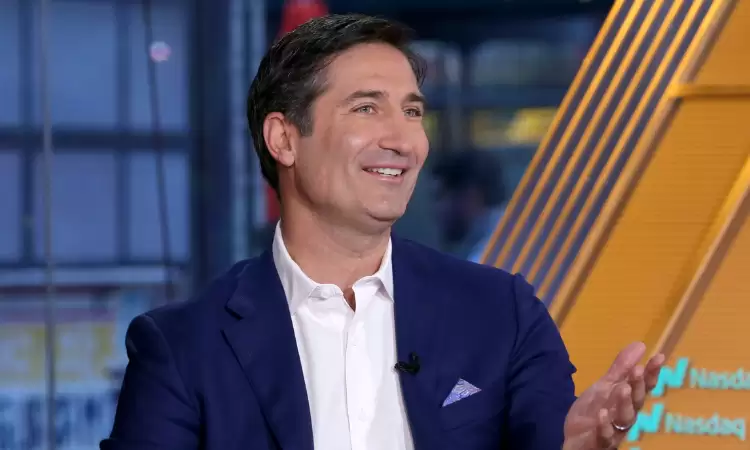Brian Niccol

Brian Niccol is a New Zealand-born screenwriter and film director known for his thought-provoking and often dystopian science fiction films. His works explore themes of technology, societal control, and the human condition, often with a sharp satirical edge.
Early Career and Transition to Filmmaking, Brian niccol wikipedia
Niccol’s initial career was in advertising, where he honed his skills in storytelling and visual communication. This experience proved valuable when he transitioned into filmmaking, as he brought a keen eye for detail and a knack for crafting compelling narratives to the silver screen. His first foray into directing came with the short film “The Fan” (1991), a darkly humorous tale that showcased his talent for blending satire with social commentary.
Directorial Style and Themes
Niccol’s directorial style is characterized by a blend of intellectualism and visual flair. He often employs a minimalist aesthetic, relying on strong performances and a carefully crafted script to drive the narrative. His films are known for their thought-provoking dialogue, complex characters, and a distinct sense of unease.
- Dystopian Settings: Niccol frequently sets his films in futuristic societies that are often oppressive or controlled by technology. This allows him to explore the potential consequences of unchecked technological advancement and the erosion of individual freedoms. Examples include “Gattaca” (1997), where genetic engineering dictates social status, and “In Time” (2011), where time itself becomes currency.
- Social Commentary: Niccol’s films often serve as a commentary on contemporary society, highlighting issues such as class inequality, corporate greed, and the impact of technology on human relationships. He frequently uses satire and dark humor to critique these issues, as seen in films like “The Truman Show” (1998), which explores the manipulation of reality and the loss of privacy in the age of media.
- The Human Condition: A recurring theme in Niccol’s work is the exploration of the human condition, including themes of identity, free will, and the search for meaning in a complex world. These themes are often intertwined with his exploration of technology and its impact on our lives, as seen in films like “S1m0ne” (2002), which examines the nature of artificial intelligence and the blurring lines between reality and illusion.
Notable Films by Brian Niccol: Brian Niccol Wikipedia

Brian Niccol is a renowned screenwriter and director known for his thought-provoking and visually captivating science fiction films. His works explore themes of technology, society, and the human condition, often pushing the boundaries of imagination and prompting viewers to question the world around them. Niccol’s films have garnered critical acclaim and commercial success, leaving a lasting impact on the science fiction genre.
Critical Reception and Box Office Performance
Niccol’s films have consistently received positive reviews from critics, who have praised his intelligent writing, thought-provoking themes, and distinctive visual style. His films have also performed well at the box office, with many achieving cult status among science fiction fans.
- Gattaca (1997): This dystopian science fiction film set in a future where genetic engineering is commonplace explores themes of social stratification, discrimination, and the pursuit of dreams. The film received critical acclaim for its stunning visuals, thought-provoking themes, and Ethan Hawke’s powerful performance as a genetically imperfect man who dreams of traveling to space. It grossed $48 million worldwide against a budget of $36 million, making it a commercial success.
- The Truman Show (1998): This satirical film tells the story of Truman Burbank, a man who unknowingly lives his entire life as the subject of a reality television show. The film was a critical and commercial success, grossing over $264 million worldwide against a budget of $60 million. It was praised for its thought-provoking commentary on media, privacy, and the nature of reality.
- Simone (2002): This science fiction drama explores the rise of a virtual actress created by a struggling filmmaker. The film received mixed reviews, with some critics praising its exploration of technology and the nature of fame, while others found it to be overly sentimental. Despite the mixed reviews, the film was a box office success, grossing over $48 million worldwide against a budget of $25 million.
- In Time (2011): This science fiction action film set in a future where time is currency explores themes of social inequality, class warfare, and the value of time. The film received mixed reviews, with some critics praising its thought-provoking premise and Justin Timberlake’s performance, while others found the film to be predictable and overly simplistic. Despite the mixed reviews, the film was a box office success, grossing over $172 million worldwide against a budget of $40 million.
Themes, Settings, and Characters
Niccol’s films are known for their distinctive themes, settings, and characters. His works often explore the intersection of technology, society, and the human condition, challenging viewers to question their assumptions about the world.
| Film | Themes | Setting | Characters |
|---|---|---|---|
| Gattaca | Genetic engineering, social stratification, discrimination, the pursuit of dreams | A futuristic society where genetic engineering is commonplace | Vincent Freeman (Ethan Hawke), a genetically imperfect man who dreams of traveling to space; Jerome Morrow (Jude Law), a genetically perfect man who is paralyzed; Irene Cassini (Uma Thurman), a genetically perfect woman who falls in love with Vincent. |
| The Truman Show | Media, privacy, the nature of reality, control, the search for freedom | A seemingly idyllic town, which is actually a giant television studio | Truman Burbank (Jim Carrey), a man who unknowingly lives his entire life as the subject of a reality television show; Christof (Ed Harris), the creator and director of the Truman Show. |
| Simone | Technology, the nature of fame, artificial intelligence, the power of imagination | A modern-day Hollywood setting | Viktor Taransky (Al Pacino), a struggling filmmaker who creates a virtual actress; Simone (Rachel Roberts), the virtual actress created by Viktor. |
| In Time | Social inequality, class warfare, the value of time, the nature of time | A futuristic society where time is currency | Will Salas (Justin Timberlake), a young man who discovers a way to manipulate time; Sylvia Weis (Amanda Seyfried), a woman who is trapped in a life of debt; Henry Hamilton (Cillian Murphy), a wealthy timekeeper who controls the flow of time. |
Brian Niccol’s Impact on Cinema

Brian Niccol’s impact on cinema is undeniable, particularly within the science fiction and dystopian genres. He has established himself as a visionary filmmaker, known for his thought-provoking narratives that explore complex societal issues and the potential consequences of technological advancements.
Exploration of Societal Issues and Technological Advancements
Niccol’s films often delve into profound questions about the nature of humanity, the impact of technology on society, and the ethical implications of scientific progress. His work is characterized by a willingness to challenge conventional thinking and to present viewers with compelling scenarios that force them to confront uncomfortable truths about the world around them.
- In Gattaca (1997), Niccol explores the potential dangers of genetic engineering and the creation of a society divided by genetic superiority. The film raises critical questions about the ethics of genetic manipulation, the implications of a society based on genetic determinism, and the potential for discrimination and social stratification based on genetic traits. It is a chilling vision of a future where individuals are judged solely on their genetic makeup, leaving no room for personal ambition or individual potential.
- In Time (2011) presents a dystopian future where time is currency, and the wealthy live forever while the poor struggle to survive. The film explores themes of social inequality, economic disparity, and the corrosive effects of a system that prioritizes wealth over human life. Niccol’s commentary on the widening gap between the rich and the poor resonates with contemporary audiences, highlighting the urgency of addressing social and economic injustices.
- The Truman Show (1998), while not strictly a science fiction film, explores themes of surveillance, manipulation, and the search for authenticity in a world saturated by media. The film’s central premise of a man’s life being a reality television show raises questions about the nature of reality, the power of media, and the importance of individual autonomy. The film’s enduring popularity is a testament to its relevance to a society increasingly reliant on technology and consumed by media.
Brian niccol wikipedia – Brian Niccol, a filmmaker known for his thought-provoking sci-fi films like “Gattaca” and “In Time,” has often explored themes of societal control and the impact of technology on humanity. His work shares a common thread with the challenges facing Starbucks CEO Laxman Narasimhan, who is navigating the complexities of a global brand starbucks ceo laxman narasimhan in a rapidly evolving digital landscape.
Niccol’s films, much like the Starbucks experience, often delve into the human element within a technological framework, raising questions about the future of both our personal lives and global corporations.
Brian Niccol’s Wikipedia page highlights his career as a screenwriter and director, known for films like “Gattaca” and “In Time.” His focus on dystopian futures and societal critiques resonates with the challenges faced by leaders like laxman narasimhan at Starbucks, navigating a rapidly changing consumer landscape.
Niccol’s work offers a glimpse into the complexities of navigating a future where technological advancements and social change collide, a theme that echoes through the leadership of individuals like Narasimhan.